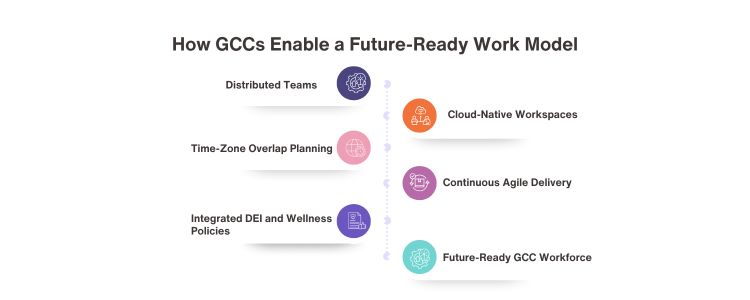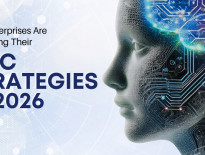
An engineer in Hyderabad, a designer in Stockholm, and a product manager in San Francisco connect through a digital workplace managed by a Global Capability Centre (GCC) in Bangalore. They work at different times, speak different native languages, and live in different cultures—yet they are building the same product pipeline in real time. This is no imagination; This is the future of work, which is already coming out. By 2025, India will have more than 1,950 GCCs, which will contribute to more than 1.5 million high-skilled jobs. India added 65 new GCCs in FY 24 alone, which is an increase of 25% year-on-year. India’s economic attraction increases further due to 30–70% cost efficiency, a digitally skilled talent pool, and strong infrastructure for hybrid work models. The cumulative economic impact of Indian GCC is estimated to be $103 billion by 2030.
The physical office has become one of the several nodes in the global net. Today’s global capability center GCC is strategically a new look to the operating model, emphasising flexible talent association and digital change at GCC. Indian cities like Bengaluru, Hyderabad and Pune now serve as the center of workplace strategies prepared for the future, which empower global distribution for BFSI, retail, healthcare and technical industries.
The visionary GCC in India is no longer focused on operating efficiency. They are now incorporating diversity, equality and inclusion (DEI) in their talent structure. Leading players are appointing professionals with neurodiversity, enabling other women to get jobs, and promoting LGBTQIA+ inclusion.
In the future of work, inclusion is no longer a checkbox—this is a basic structure. In India, GCC, beyond appearances, is leading global efforts to promote diverse, equivalent and human-focused workplaces. These initiatives are giving remarkable results in retention, innovation and employer brand equity.
These are not independent human resources initiatives. These workplace strategies are the lever that aligns with them: Inclusion enables flexibility in indefinite times, improves cross-border cooperation, and speeds up innovation by exposing diverse thinking. In fact, according to a report, companies falling in the top quartile in terms of gender and ethnic diversity perform 25–36% better than companies falling in the lower IV in terms of profitability.
India’s socio-cultural complexity makes it a fertile basis for the scalable inclusion model. Strong government support (e.g., rights of persons with the Rights Act, POSH law, etc.) and increasing DEI awareness and digital-first complexes, Indian GCCs are specially located to export inclusive innovation globally.
The GCC is designed for a 24 -hour innovation cycle, where across-the-border teams easily collaborate. With the growth of distance work trends, Indian GCC has integrated cloud-based productivity suites, safe digital workplace and AI-operated workforce management equipment to strengthen asynchronous cooperation. This is not only about flexibility; it is about providing speed and scale with accuracy. In 2024, 78% of Indian GCCs fully support remote work trends or hybrid function structures.
Today’s global capability centers act as strategic cultural seats, which convert enterprise targets into regionally relevant implementation. Indian GCCs are leading border research and development, co-forming intellectual property with global business units, and enabling local innovation in markets such as Asia-Pacific, Middle Europe, and North America. Companies such as Atlassian, Microsoft and Goldman Sachs have redesigned their Indian GCC as centers for cross-functional, co-located teams that make innovation, testing and sins a reality. In India, a form of Human-Cloud Organisation was established. It is swinging towards GCC as a Service that is modular, scaleable and prioritised to the people. In this model, organisations are using India’s digital fluidity and multilingual talent through the AI-enabled skills. With smart scheduling, immersive onboarding and predicted resources, GCC has become a platform, not just one place.
As the global center of the GCC, India is not only providing labour; rather, it is shaping the next paradigm of the task, a paradigm that is more inclusive, agile and globally coordinated. India is preparing the global enterprise for the future with strategic investment in skill development, policy support for distance infrastructure, and innovation.
Inclusion is the origin of the GCC strategy. Leading centers focus on gender diversity, disability inclusion, nerve-class recruitment and LGBTQIA empowerment to speed up innovation and create teams prepared for the future. Yes. According to Nasscom-BCG 2024 data, 78% of Indians work on GCC hybrids or remote-first models, which integrate flexibility, productivity and employee welfare in the main operations. By acting as a cultural bridge, Indian GCCs align regional business requirements with excessive communication, tight structure and multilingual, multicultural teams with global strategies. AI-operated analytics, cloud-elevated platforms, devops, cyber flexibility and digital workplace equipment (e.g., MS Teams, Jira, Zoom, Servicenow) are at the center of digital change in the GCC. Companies have access to huge technical talent pools, operating costs up to 70% of savings, and they avail India’s innovation ecosystem—leading to profit, scale and investment profit (ROI) on speed, scale and investment. Aditi, with a strong background in forensic science and biotechnology, brings an innovative scientific perspective to her work. Her expertise spans research, analytics, and strategic advisory in consulting and GCC environments. She has published numerous research papers and articles. A versatile writer in both technical and creative domains, Aditi excels at translating complex subjects into compelling insights. Which she aligns seamlessly with consulting, advisory domain, and GCC operations. Her ability to bridge science, business, and storytelling positions her as a strategic thinker who can drive data-informed decision-making.
GCC as a New Operating System For Talents
Democratisation of Opportunities Through GCC
Included Functioning of GCC In India
Key Inclusion Programmes and Their Impact
Initiative
GCC Company Example
What It Is
Outcome/Strategic Benefit
Returnship for Women
Mastercard GCC, Pune
A curated programme helping women rejoin the workforce after career breaks
200+ women reintegrated with >90% retention post-programme
Neurodiversity Hiring
SAP Labs India
Structured onboarding & support for neurodivergent professionals
4% rise in innovation KPIs; increased problem-solving diversity
Inclusive Leadership Training
Target GCC, Bengaluru
DEI-led training for mid- and senior-level managers to build inclusive teams
27% rise in inclusive behaviour scores in internal assessments
LGBTQIA+ Inclusion Charter
Citibank India GCC
Gender-neutral HR, same-sex partner benefits, and sensitivity workshops
3x increase in LGBTQIA+ hiring over 3 years
Digital Accessibility Audits
Accenture India GCC
Full digital product compliance using WCAG 2.1 standards
100% accessibility for internal and B2B tools; legal risk reduced
Hiring from Tier-2/3 Cities
JPMC India GCC
Satellite office strategy and remote hiring to boost regional inclusion
32% of new hires from non-metros; improved talent access and loyalty
Cross-Cultural Immersion Pods
Bosch India GCC
Global mentorship programmes for diverse cultural teams
20% faster cross-functional integration; improved leadership readiness
Language-Neutral Hiring Panels
Google India GCC
Diverse panel policies with unconscious bias mitigation training
18% increase in diverse applicant conversion rates
Disability Inclusion Programme
IBM India GCC
AI-based assistive tech, physical accessibility, and disability hiring
6% of the workforce is from the PwD category; inclusion is praised by global leadership.
Women in Tech Sponsorships
Dell Technologies GCC
Executive sponsorships & fast-track leadership programmes for women
3x increase in women tech leads over two years
Why Are These Practices Important?
India's Advantage in The Inclusive GCC Model
Incredible, Tight, Always on: DNA Flexibility

Global Cooperation: Active Cultural Setup
Conclusion
frequently asked questions (FAQs)

Aditi
Hey, like this? Why not share it with a buddy?
Related Posts
Recent Blog / Post
- Pharma GCC Setup Services in India: Strategic Considerations for CXOs January 9, 2026
- Why Enterprises Are Rethinking Their GCC Strategies in 2026 January 8, 2026
- Why Most Enterprise Expansion Strategies Fall Short of Projections, And How a GCC Enabler Can Bridge the Gap January 7, 2026
- India’s GCC Ecosystem: Why the World’s Biggest Companies Are Betting Their Future on it January 3, 2026
- Healthcare GCCs in India: Where the World’s Pharmaceutical Innovation Actually Happens January 2, 2026
- Circular Economy Models and Their Relevance to Manufacturing GCCs December 30, 2025
- GCCs in Agritech: Digitizing Global Food Security December 29, 2025
- Renewable Energy GCCs: Accelerating Global Green-Tech Development December 29, 2025
- Cyber Resilience 2030: Multi-Layer Security Architecture for GCCs December 26, 2025
- Building an Integrated Risk Management Framework for Multi-Region GCCs December 26, 2025
- The Ethics of Automation: How GCCs Maintain Human Oversight in AI Workflows December 25, 2025
- Future of HR in GCCs: Data-Led, Skills-Based, and GenAI-Driven December 25, 2025
- The Proposal to Standardize India’s GCCs for Unshakeable Global Leadership December 24, 2025
- Global Capability Centers: A Strategic Growth Model for B2B Enterprises December 24, 2025
- AI Ethics & Compliance Mandates for GCC Operations in 2025 December 23, 2025
















